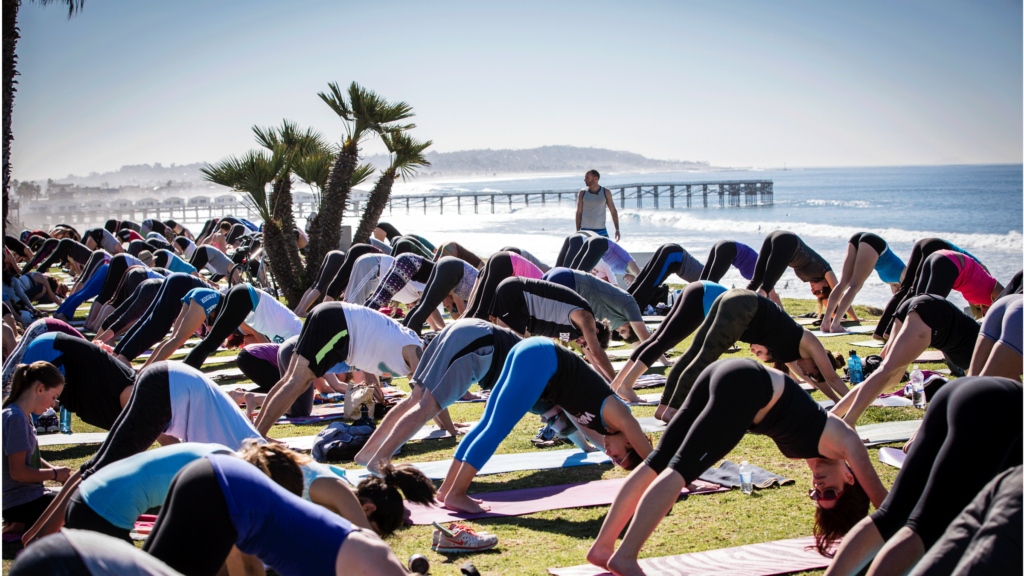
“], “filter”: { “nextExceptions”: “img, blockquote, div”, “nextContainsExceptions”: “img, blockquote, a.btn, a.o-button”} }”>
Heading out the door? Read this article on the new Outside+ app available now on iOS devices for members!
>”,”name”:”in-content-cta”,”type”:”link”}}”>Download the app.
Yoga teachers in San Diego are suing the city over its efforts to enforce an ordinance that places limitations on classes taking place at beaches and parks. Earlier this year, the city council approved an amendment to the ordinance that barred yoga classes consisting of four or more people unless the teachers have a permit, which are available only for select beaches and parks. The original regulation, approved in 2022, restricted activities of street vendors in public spaces.
Now, teachers are arguing that this violates their First Amendment rights. “It’s our right to assemble in a public park. We are just trying to share a practice,” explained Steve Hubbard, one of the yoga instructors suing San Diego, in an interview with Yoga Journal.
What the Ordinance Means for Yoga Classes
Yoga teacher Amy Baack had been teaching yoga twice a week at Sunset Cliffs since 2021 until recently. “On a Wednesday evening, I showed up to teach my class, and there were three park ranger trucks all parked out on the cliffs,” she explained. “They told me that we weren’t allowed to be there anymore.”
Similarly, Hubbard was issued citations for teaching beach classes on May 18 and June 1. Ultimately, the two teachers joined together and filed a lawsuit against the city on June 3.
San Diego is one of many cities throughout the country that requires a permit for activities held in public spaces. The specific regulations and fees vary depending on the municipality and the number of attendees.
Hubbard had previously experienced conflict with the city related to leading classes on the beach without a permit. “About 11 years ago, they gave me tickets for teaching here [on Pacific Beach] as well. I’ve been doing this class for 17 years, and I went to court for those tickets,” he said.
At the time, the city didn’t allow more than 49 people to gather for a class in the park, said Hubbard. According to the San Diego Municipal Code, commercial permits must be obtained by those who are teaching yoga and fitness classes, although “groups of fewer than 50 people who are not engaged in a commercial activity or service do not require a permit.”
“I told the judge I don’t have the right to kick the 50th person out of the park,” Hubbard said of the past situation. “He agreed with us.”
However, the recently amended ordinance brings a different set of regulations. A City of San Diego Parks and Recreation spokesperson told Yoga Journal that the concerns stemmed from increased business activity in the parks and on the beaches since the pandemic. “The City saw a proliferation of businesses operating illegally in public spaces, attracting crowds of people and vehicles to areas that were not equipped to accommodate the influx. The situation also impeded access to beach and park areas for residents and visitors,” said the spokesperson.
“Like most coastal cities, San Diego’s Municipal Code (SDMC) regulates commercial activities in City-owned areas to ensure parks, beaches, and public spaces remain safe and accessible to all people at all times,” explained the spokesperson.
The SDMC defines commercial activities or services (which are listed together) as “the performance of work for others… or the provision of intangible items to a group of four persons or more at the same time that cannot be returned once they are provided.” Yoga and fitness classes are listed as examples of services.
Baack and Hubbard dispute being lumped into the same category as a business owner or a street vendor. They say their classes are donation-based, free to anyone, and designed for inclusivity.
“[Most yoga teachers] don’t make much money, so I know what it is to still want to take a class and enjoy a beautiful experience—especially in a park that we pay taxes for,” says Baack. “We pay to live in San Diego, to go to the beach. The point of San Diego is to be by the water.”
Parisa Pease, ESQ, co-counsel on Hubbard and Baack’s case, explained that those who make the least amount of money will be most affected by this new city ordinance. “This effectively disproportionately harms the lowest income San Diegans who are denied access to these high-quality community-based classes aimed at improving physical and mental well-being. Not everyone can afford the exorbitant membership fees otherwise needed.”
Bryan Pease, ESQ, co-counselor for Hubbard and Baack’s case, said they will take legal steps to try to restore yoga in the park. “We will be seeking a preliminary injunction to stop the City from preventing the practice of yoga in City parks while the case is pending,” says Bryan Pease. “Ultimately, winning the case will ensure that people can continue to teach and learn yoga in City parks for free or with optional donations.”
The Current Status of Beach Yoga in San Diego
In the interim, Hubbard has continued teaching classes via YouTube from his backyard. Sometimes a couple of his students will gather at his old teaching spot, unroll their yoga mats, and stream the class. “The people in the park bring a speaker, and just one person goes on their phone and hooks it up to the speaker,” he explained.
Baack was gifted space to teach. Jimmy’s American Tavern lent her its private marina in Point Loma to host her classes. Still, she hopes to return to her old spot with her regulars. “I’ve had a big loss of the number of students that I’m getting, and I just miss everybody,” says Baack.
The City of San Diego Parks and Recreation spokesperson says that one fitness teacher has already successfully acquired a permit to teach classes on the shoreline parks. According to The City of San Diego website, more than 60 park locations are available for these permits.









